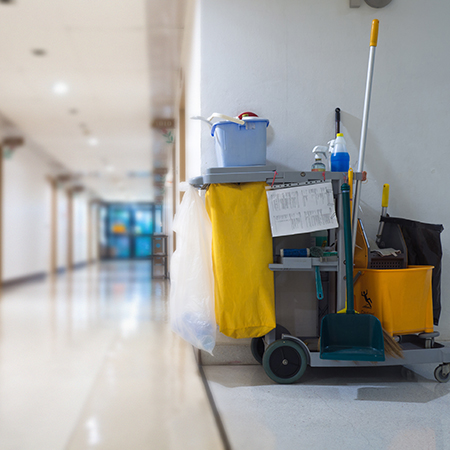Cleaning industry leaders have warned that cleaning staff in healthcare, hospitality and other parts of the sector are facing burnout because of increased workloads due to the COVID-19 pandemic and severe staff shortages.
The extra procedures and protocols put in place during the pandemic to protect people’s health, along with the current severe staff shortages in the sector have been compounded by staff absences due to winter illnesses and the disease itself as well as increasing numbers of personnel leaving the industry, to create a dangerous cocktail which has raised concerns for the health of staff.
The crisis in the cleaning and hygiene industry is so severe and widespread that industry body the British Cleaning Council (BCC) has warned recently that the health of members of the public could be put at risk because of difficulties maintaining the measures needed to keep the UK’s buildings hygienically clean and reduce the risk of the COVID-19 virus spreading.
As we approach the depths of winter, the recruitment crisis could not have come at a worse time and the BCC has called for urgent Government help.
Delia Cannings, Deputy Chair of the BCC, National Lead for Education and Training at the Association of Healthcare Cleaning Professionals (ahcp) and Chair of the UK Housekeepers Association (UKHA), says: “We are starting to see the cracks in the healthcare sector, with shortcuts, slip ups and accidents increasing. What can we do if we can’t get the staff? We are not miracle workers, we simply cannot keep this pace up. The health and wellbeing of our workforce is at stake here.
“Fractures are appearing from all sides. Very few staff are available, the labour market is almost dried up. Agency staff where available are not adequately trained.
“Staff absences are increasing every day due to colleagues becoming ill, self-isolating or simply fatigue. Staff are taking on extra duties and managers are rolling up their sleeves to help with the practical cleaning aspects yet are still unable to fill the gaps as well as manage and audit the cleaning service effectively.
“Many long-standing cleaning operatives with years of experience are choosing to leave the profession citing their roles as undervalued and the risk factors as too high.
“My healthcare cleaning colleagues are proud of their work and do their best to fill the gaps. Therefore longer shifts and overtime have become commonplace in an effort to support colleagues who are already exhausted and on their knees.
“This is not sustainable and will impact on people’s physical and mental health. We are seeing cases of staff turning to alcohol and substance abuse, and anxiety, depression and domestic abuse are all rising. I fear we will see colleagues burning out in the longer term.”
BCC Chairman, Jim Melvin, says professionals throughout the cleaning sector have been “undervalued by a Government which says they are low skilled and won’t recognise them as key workers.”
He has written to BCC members and industry partners to raise concerns about this and the response of the All-Party Parliamentary Group (APPG), to which BCC acts as secretariat. Whilst some progress has been made on apprenticeships, the letter says the BCC was “shocked” by the response of members of the APPG at a virtual meeting held before Xmas to discuss the situation. At this meeting it was made clear that the Government would not consider making any exceptions to the Immigration Act or consideration to granting temporary visas for cleaning staff – even though it has for HGV drivers, fruit pickers and poultry workers, stating this would be “political suicide.” The assertion that the cleaning industry remains “low skilled,” employing “cheap foreign labour,” and the implication that it is of less importance than other sectors that are also raising resourcing issues by lobbying Government should, the letter states, be cause for offence.
What happens next
The BCC is setting out the actions it intends to take with three separate approaches. It plans to speak with several larger employers and is urging members to engage with information about how the industry is trying to help itself, with measures such as modernisation. In order to strengthen its position before approaching Government, the BCC has set out several questions which it is asking members to answer by email by February 1, 2022.











